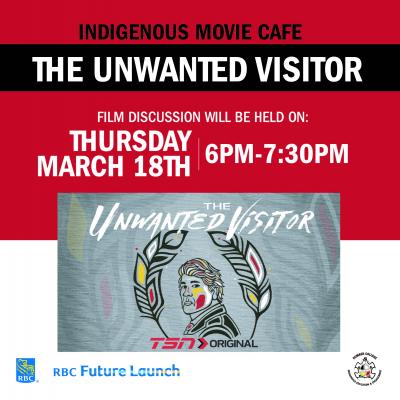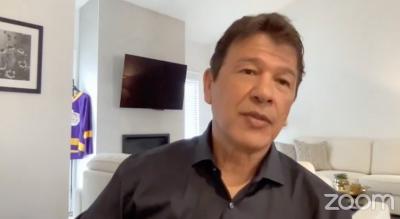When Ted Nolan was in elementary school in Sault Ste. Marie, Ontario, he rode the bus from Garden River First Nation with a group of other kids from his community. He remembers facing anti-Indigenous racism daily once they got to school.
“We were bonded together, though, and we protected one another,” he said.
His documentary film, The Unwanted Visitor, deals with fitting in, perseverance and racism – both personal and systemic. After his NHL playing career in the early/mid 80s, he launched a prolific coaching career, during which he continued to face obstacles. The film was shown earlier in March during an Indigenous Movie Café event at Humber. 
Today, Nolan supports Indigenous students through the Ted Nolan Foundation, which encourages them to pursue academic growth. He is also the founder of 3 Nolans, with his sons Brandon and Jordan, who also played in the NHL.
On March 23, he spoke to Humber students over Zoom as part of the launch of the RBC Grad-Ready Program that he sees as valuable and essential.
“I was blown away, to tell you the truth. I’ve never seen anything like it, not just in academics,” Nolan said.
RBC’s “Grad-Ready” contribution
Humber’s Indigenous Education & Engagement department hosted Nolan for the launch of this new program, which offers a specialized career coach and resources for Indigenous student and recent graduates in their first year of employment.
“We know how hard it is to search for the next position or what line of work you might be interested in. When I read about this program, I thought, ‘Boy, this program should be shared,’” said Nolan.
The RBC Grad-Ready Program includes guidance and advice for Indigenous students and graduates as they start navigating their job search, networking and building meaningful careers. It also connects them to employers.
“This is an investment in our collective future, because when the next generation of professionals succeed, society at large wins,” said RBC Mortgage Specialist Jessica Shute, who spoke at the launch of the program.
RBC’s $250,000 donation to Humber also supports another new program, the RBC Peer-to-Peer Support System. The program will pair upper-year Indigenous students with others who are transitioning into college life. Mentors will receive comprehensive training including mental health and career advising training and will then help connect their mentees to support and resources they need to succeed in life in and out of college. The RBC Peer-to-Peer Indigenous Support System will launch in Fall 2021. 
“We appreciate the support and commitment from RBC to further advance our Indigenous students’ success. This Aligns with our theme of Mino Nawendiwin: Good relationships from our Indigenous Education plan. The good relationships between, RBC, Humber College and our students is a main pillar of how we can achieve success by working together,” said Dean of Indigenous Education & Engagement, Jason Seright.
‘You have to go together’
Nolan says the peer-to-peer mentorship and shared experience of Indigenous students are important.
“When I went to Kenora [to play hockey], I was by myself. To this day my wife asks me how I made it through that year.”
When he visits schools in Indigenous communities, he often hears Principals tell their students to walk in pairs and stay safe.
“I don’t think we know how afraid our kids are. You have to understand why.” he said.
Nolan recalls a phrase often recited by one of his elders: “If you want to go far, you’ve got to go together. If you want to go somewhere fast, go by yourself.”
He believes that emphasis on community, reflected in Humber and RBC’s innovative programs, is integral to success.
“Our family connections and our empathy toward one another and protection of one another are very powerful,” he said.
“Nobody does it alone.”
For more information on the RBC programs, click here.